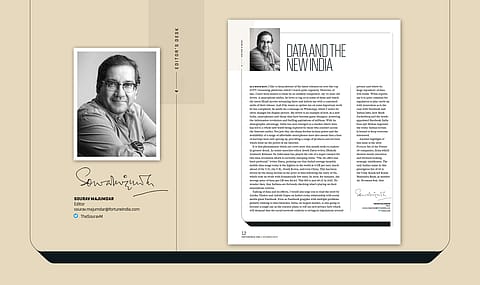Data and the new India
Editor’s Letter from the November 2018 issue

As a movie buff, I like to keep abreast of the latest releases on over-the-top (OTT) streaming platforms which I watch quite regularly. However, of late, I have been beaten to them by an unlikely competitor: my 32-year-old driver. A smartphone addict, he loves to log on to some of them and watch the latest Hindi movies streaming there and inform me with a contented smile of their release. And if he wants to update me on some important work he has completed, he sends me a message on WhatsApp, where I notice he often changes his display picture. My driver is an example of how, in a new India, smartphones and cheap data have become game changers, powering the information revolution and fuelling aspirations of millions. With its demographic advantage, India has now emerged as a market where data has led to a whole new world being explored by those who couldn’t access the Internet earlier. Not just this, the sharp decline in data prices and the availability of a range of affordable smartphones have also meant that a host of startups have now sprung up, providing a range of products and services which draw on the power of the Internet.
It is this phenomenon which our cover story this month seeks to explore in greater detail. As senior associate editor Aveek Datta writes, Mukesh Ambani’s Reliance Jio Infocomm has played the role of a major catalyst for this data revolution which is currently sweeping India. “The Jio effect has been profound,” writes Datta, pointing out that India’s average monthly mobile data usage today is the highest in the world at 8 GB per user, much ahead of the U.S., the U.K., South Korea, and even China. This has been driven by the sharp decline in the price of data following the entry of Jio, which took on rivals with dramatically low rates. In 2014, for instance, the average price of data per GB was $4.40. This fell to just $0.17 in 2017. No wonder then, that Indians are furiously checking what’s playing on their smartphone screens.
Talking of data and its effects, I would also urge you to read the story by Arnika Thakur and Ashish Gupta on India’s rocky relationship with social media giant Facebook. Even as Facebook grapples with multiple problems globally relating to data breaches, India, its largest market, is also going to become a tough one as the country plans to roll out new privacy laws which will demand that the social network conform to stringent stipulations around privacy and where its large repository of data will reside. While experts say it is quite common for regulation to play catch-up with innovation as is the case with Facebook andIndian laws, how Mark Zuckerberg and the newly appointed Facebook India boss Ajit Mohan negotiate the tricky Indian terrain is bound to keep everyone interested.
Another highlight of this issue is the 2018 Fortune list of the Future 50 companies, firms which showed steady execution and forward-looking strategic nimbleness. The only Indian name in this prestigious list of 50 is the Uday Kotak-led Kotak Mahindra Bank, at number 42. No mean feat, that.
(The article was originally published in the November 2018 issue of the magazine.)